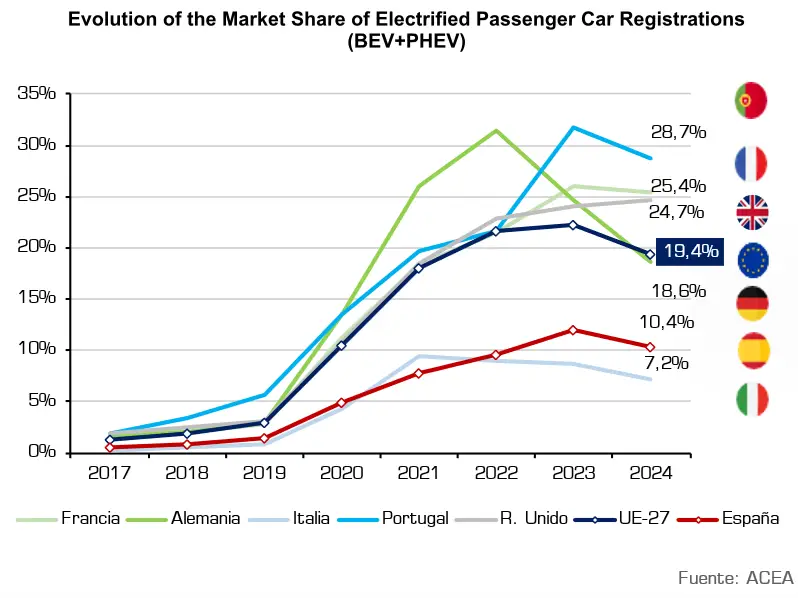The average age of cars on Spain’s roads continues to climb, reaching 14.2 years in 2023.
This is according to the latest report from the Asociación Española de Fabricantes de Automóviles y Camiones (ANFAC). Spain now has one of the oldest car fleets in Europe, well above the continent’s average of 12.3 years.
Out of the 30 million vehicles currently in circulation, nearly half are 15 years old or more. For every new car sold, 1.3 cars over ten years old are bought, a trend that is delaying fleet renewal and hampering efforts to reduce emissions.
Low Emission Vehicles Still a Minority
Despite some progress, low and zero-emission vehicles still make up only a small percentage of Spain’s car fleet. Vehicles with the DGT’s “Etiqueta 0” and “ECO” labels, indicating low emissions, have increased by 50.9% and 31%, respectively, in 2023. However, they represent just 5.7% of the total vehicles on the road.
By contrast, 29.4% of the fleet still consists of vehicles without any environmental labels, and 29.8% are classified under “Etiqueta B,” which includes older, more polluting cars. Despite a slight reduction in non-labeled vehicles, the pace of transition remains slow.
Electric Vehicles: A Small but Growing Segment
Pure electric vehicles are gradually gaining ground, with 170,410 electric cars now on the road in Spain, marking a 54.9% increase from the previous year. Yet, they still only account for 0.5% of the total fleet. Plug-in hybrid vehicles have also grown by 46.8%, with 196,734 units, making up 0.6% of the total.
ANFAC highlights the importance of improving Spain’s charging infrastructure to support further electrification. While the number of public charging points has increased to 32,422, the majority are slow chargers with a capacity of less than 22kW, which could hinder the growth of electric vehicle adoption.
There is a general upward trend in the adoption of electric vehicles, with Portugal leading at 28.7%, followed by France at 25.4%, the United Kingdom at 24.7%, and the EU-27 average at 19.4%. Spain has the lowest adoption rate among the countries shown, with a rate of 7.2% in 2024.
The Urgent Need for Renewal
As Spain’s car fleet continues to age, the need for renewal becomes increasingly urgent, not only for environmental reasons but also for road safety. According to ANFAC, a modern Euro 6d vehicle emits 70% less NOx and 30% less CO2 compared to a car that is 14 years old—the current average age of vehicles in Spain.
Calls for Government Action
José López-Tafall, the director general of ANFAC, expressed growing concern over the aging fleet. “Each year, we are more worried about the aging of our car fleet. In 2023, the average age of vehicles surpassed 14 years. It is crucial to revitalize the market and surpass the one million units barrier to introduce newer, more sustainable, and safer vehicles.”
López-Tafall emphasized the need for government incentives and fiscal policies that encourage the purchase of electrified vehicles. He also called for continued support for the MOVES program, which provides direct incentives for purchasing electric vehicles.
The aging fleet is not just a matter of sustainability, but also efficiency and, most importantly, safety. ANFAC urges the Spanish government to take decisive action to modernize the nation’s car fleet and support a transition to greener, safer transportation.














